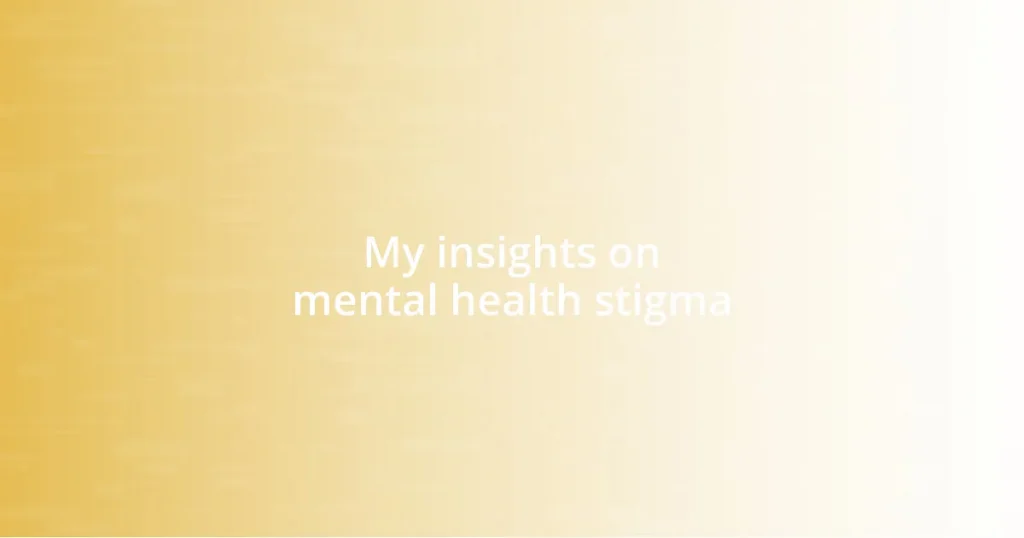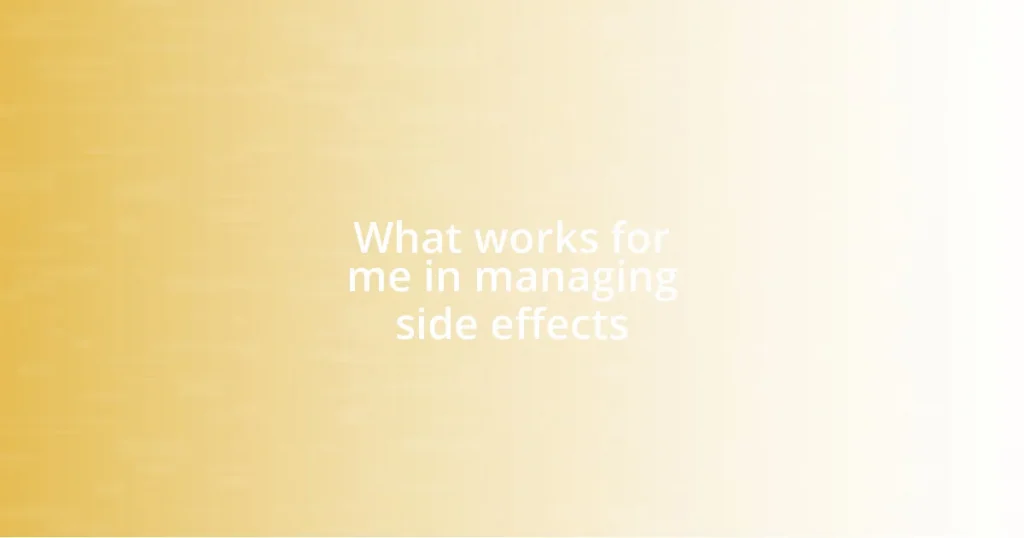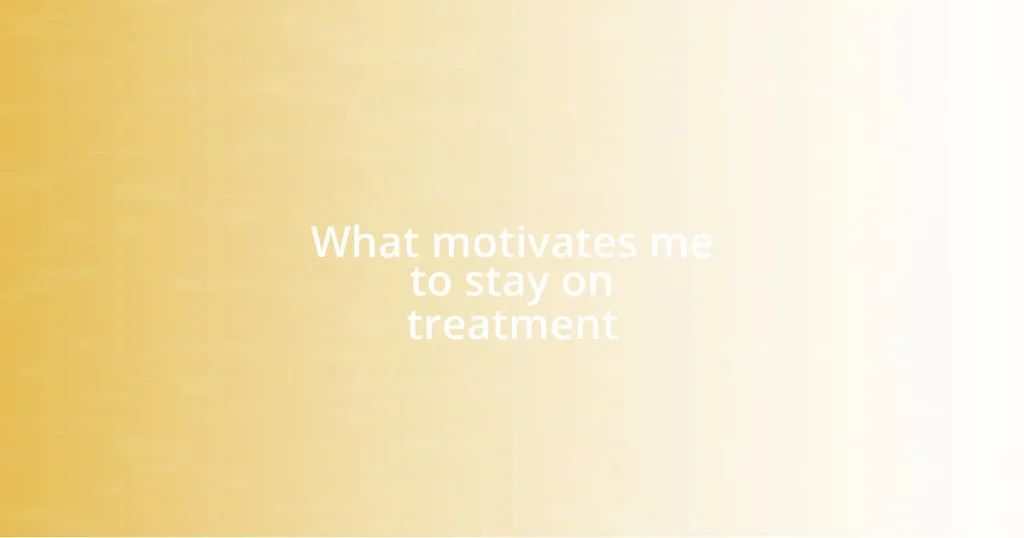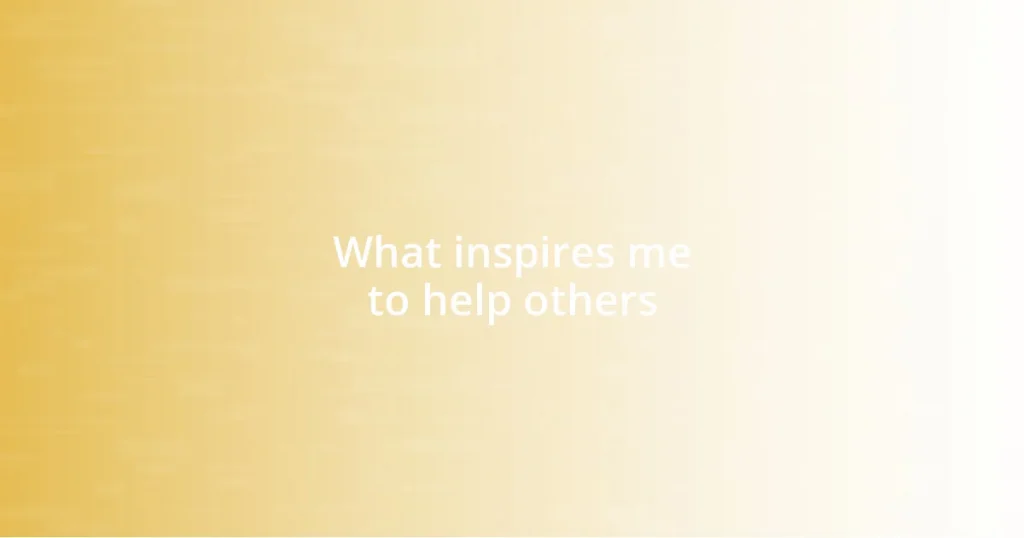Key takeaways:
- Mental health stigma stems from misconceptions, lack of knowledge, and cultural attitudes, leading to fear and isolation for those affected.
- Open conversations about mental health foster understanding and empathy, decreasing feelings of shame and sparking positive change in attitudes and support.
- Supporting those affected by stigma involves education, compassion, and creating safe spaces for individuals to express their experiences without fear of judgment.

Understanding mental health stigma
Mental health stigma is a complex web of misconceptions and negative perceptions that can deeply affect those grappling with mental health issues. I remember a friend of mine who faced ridicule when he opened up about his anxiety. It made me wonder—why do we often equate vulnerability with weakness? Understanding this stigma requires us to recognize that these harmful beliefs often stem from fear and a lack of knowledge about mental health.
Often, stigma manifests in subtle ways, like when someone avoids a friend because they don’t know how to handle their emotional struggles. It’s disheartening, and I’ve seen it firsthand. I once hesitated to tell others about my own battles with depression, fearing judgment. Isn’t it incredibly ironic that the very act of seeking help can make one feel isolated? It leads to a cycle where individuals suffer in silence rather than seeking the support they desperately need.
Moreover, mental health stigma can have tangible effects on recovery. People may refrain from seeking treatment or disclosing their issues in the workplace due to fear of being labeled. It’s painful to think that stigma can prevent someone from experiencing the healing power of community and support. Why should anyone feel ashamed for striving to improve their mental health? It’s time we change the narrative and approach these conversations with empathy and open-mindedness.

Causes of mental health stigma
The roots of mental health stigma often lie in societal perceptions and cultural attitudes. Growing up, I encountered environments where mental health was rarely discussed, and when it was, it was often framed in a negative light. That silence breeds misunderstanding; without education, people tend to fill the gaps with stereotypes or fear. It’s frustrating to witness how these viewsets can dictate behaviors, creating barriers that prevent open dialogue and understanding.
Consider these common causes of mental health stigma:
- Lack of Awareness: Many individuals simply aren’t informed about mental health issues, leading to misconceptions.
- Cultural Beliefs: In some cultures, mental illness is misunderstood or considered shameful.
- Media Portrayal: Often, media representations exaggerate or misrepresent mental health conditions, reinforcing negative stereotypes.
- Fear of the Unknown: The unfamiliar can be frightening. People may distance themselves from what they do not understand, often labeling it as “other.”
- Historical Perspectives: Stigmas can persist from outdated beliefs and practices about mental illness that are no longer valid.
Reflecting back, I met someone who avoided discussing her experience with PTSD because she feared being perceived as “broken”—the very idea of that hurt my heart. Each time I see someone struggle in silence, I question: How can we dismantle these damaging ideas and cultivate a more accepting environment for all?

Effects of stigma on individuals
The effects of stigma can be profound and often linger long after the initial confrontation. I recall a colleague who was open about her bipolar disorder but faced casual dismissal from teammates. They called her “emotional” without understanding her condition. This dismissal led her to hide her true self and struggle in silence, which only fed her anxiety and made her feel like she had to wear a mask all the time.
Over the years, I’ve witnessed individuals self-isolating due to the fear of being judged. For instance, a family member of mine stopped attending social gatherings because he felt different after his diagnosis. The pressure to conform to societal norms made him retreat, robbing him of the joys of connection and companionship. This isn’t just sad; it’s a reminder that stigma creates invisible walls between people, fostering loneliness that compounds the challenges of mental health.
Moreover, stigma can directly impact treatment and recovery pathways. Friends don’t always recognize the courage it takes to reach out for help. I’ve been there, doubting whether to talk to a therapist simply out of fear of what others might think. Unfortunately, that hesitation can delay recovery. This cycle of self-doubt not only impedes personal progress but similarly affects those around us. If only people could see the strength in vulnerability, perhaps more would choose to step forward into the light.
| Effect of Stigma | Personal Insight |
|---|---|
| Social Isolation | I’ve seen friends pull away, believing it would be easier than addressing their struggles. |
| Fear of Disclosure | My own hesitation to share my mental health journey stems from worrying about how others would react. |
| Delayed Treatment | A family member avoided therapy due to fears of being judged, prolonging their suffering. |

Importance of open conversations
Open conversations about mental health can break down the barriers of stigma, allowing individuals to share their experiences without fear. I remember a time when a dear friend opened up about her anxiety during a casual gathering. The flood of support that followed was genuinely touching—it felt like an invisible weight lifted off her shoulders. This moment highlighted for me how vital it is to create spaces where feelings can be voiced freely. Why should we allow shame or fear to overshadow someone’s story?
When we normalize discussions around mental health, we foster a culture of understanding and empathy. I’ve seen this firsthand in community workshops where participants dared to share their struggles. The atmosphere shifted from one of discomfort to comfort; suddenly, individuals felt less alone. It made me consider: what if everyone engaged in these conversations more often? Imagine the comfort someone might find just by knowing that they are not the only one navigating this path.
Furthermore, open conversations encourage a commitment to change. After sharing my own mental health journey with colleagues, I was astonished at the number who approached me with their stories or questions. It became clear just how many people had been waiting for the chance to talk. This realization made me wonder: could every conversation serve as a stepping stone toward greater awareness and healing? With every word exchanged, we chip away at the stigma that isolates too many.

Supporting those affected by stigma
Supporting those affected by stigma requires a collective effort grounded in empathy and understanding. I once met a volunteer at a mental health charity who shared how she provided a listening ear to those who felt silenced by their struggles. Her kindness bridged gaps between people, showing me the healing power of simply being present. Isn’t it astonishing how a little compassion can uplift someone trapped in solitude?
In my experience, small gestures can lead to significant changes. A friend of mine started a support group in her community, where individuals could express their thoughts and feelings without fear of judgment. The transformation was palpable; people grew more confident in sharing their experiences, and friendships blossomed from these moments of vulnerability. It got me thinking: how many lives could we touch if more of us created such welcoming spaces?
Moreover, I’ve learned that education plays a crucial role in supporting those affected by stigma. I attended a workshop focused on mental health awareness, and it opened my eyes to the different ways stigma manifests. Understanding these nuances ignited a passion in me to engage in conversations that challenge misconceptions. When was the last time you sought to educate yourself or others about mental health? Sometimes, the most powerful support we can offer is knowledge, as it helps dismantle the barriers that keep us apart.















